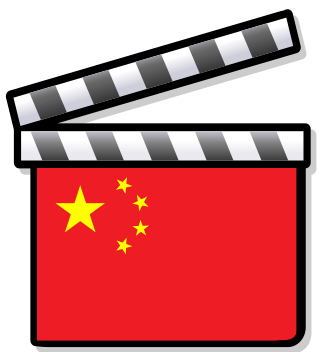
The cinema of China is the filmmaking and film industry of the Chinese mainland under the People's Republic of China, one of three distinct historical threads of Chinese-language cinema together with the cinema of Hong Kong and the cinema of Taiwan. China is the home of the largest movie and drama production complex and film studios in the world, the Oriental Movie Metropolis and Hengdian World Studios. In 2012 the country became the second-largest market in the world by box office receipts. In 2016, the gross box office in China was CN¥45.71 billion. China has also become a major hub of business for Hollywood studios.

Zhang Yimou is a Chinese filmmaker. A leading figure of China's Fifth Generation directors, he made his directorial debut in 1988 with Red Sorghum, which won the Golden Bear at the Berlin International Film Festival.
Crazy English is a brand name related to a non-traditional method learning English in mainland China conceived by Li Yang. Li believes that the traditional way of learning English in China is ineffective. Li Yang's method places heavy emphasis on practicing English orally. His method can be described with the slogan "By shouting out loud, you learn." In many ways it remains similar to the traditional pedagogic practices of Chinese education in that it still relies on repetition and recitation. Members of the school administration in China often disapprove of the method because they believe it goes against the traditional Chinese values of modesty and restraint.

Jia Zhangke is a Chinese film and television director, screenwriter, producer, actor and writer. He is the founder of Pingyao International Film Festival, dean of the Shanxi Film Academy of Shanxi Media College and the dean of the Shanghai Vancouver Film School at Shanghai University. He graduated from the Literature Department of Beijing Film Academy. He is generally regarded as a leading figure of the "Sixth Generation" movement of Chinese cinema, a group that also includes such figures as Wang Xiaoshuai, Lou Ye, Wang Quan'an and Zhang Yuan.

Tian Zhuangzhuang is a Chinese film director, producer and actor.
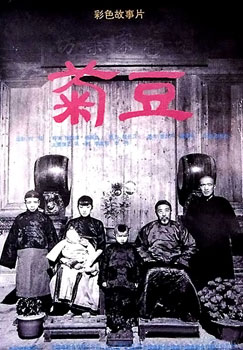
Ju Dou is a 1990 film directed by Zhang Yimou and Yang Fengliang, starring Gong Li as the title character. The film, based on the novel Fuxi, Fuxi (伏羲伏羲) by Liu Heng, is a tragedy that revolves around Ju Dou, a beautiful young woman sold as a wife to Jinshan, an elderly cloth dyer. The film was produced using the vivid Technicolor process, long after it had been abandoned in the United States. It became the first Chinese film to be nominated for an Academy Award for Best Foreign Language Film.

Beijing Film Academy is a municipal public college in Beijing, China. It is affiliated with the City of Beijing, and co-funded by the Beijing Municipal People's Government, the National Radio and Television Administration, and the Ministry of Education.
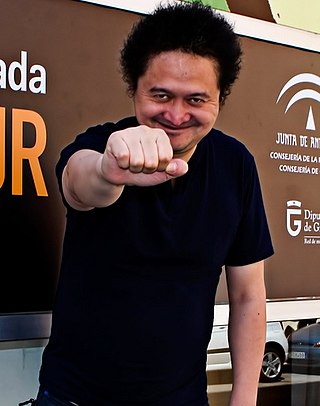
Zhang Yuan is a Chinese film director who has been described by film scholars as a pioneering member of China's Sixth Generation of filmmakers. He and his films have won ten awards out of seventeen nominations received at international film festivals.

Wang Xiaoshuai is a Chinese film director, screenwriter, and occasional actor. He is commonly grouped under the loose association of filmmakers known as the "Sixth Generation" of the Cinema of China. Like others in this generation, and in contrast with earlier Chinese filmmakers who produced mostly historical drama, Wang proposed a “new urban Chinese cinema [that] has been mainly concerned with bearing witness of a fast- paced transforming China and producing a localized critique of globalization.”
Li Yang is a Chinese educator and language instructor. He is the creator of Crazy English, an unorthodox method of teaching English. He claimed to have taught English to more than 20 million people in a decade.

Li Yang is a Chinese writer-director. Though often grouped with the so-called Sixth Generation of Chinese filmmakers, he is in fact closer in age to the Fifth Generation and in interviews has denied membership with either group, claiming that such labels are only artificial differentiations.
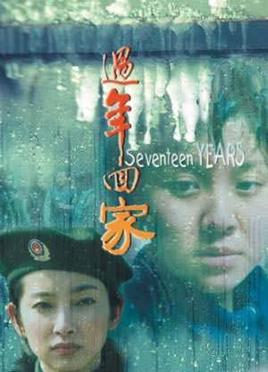
Seventeen Years is a 1999 Chinese film directed by Zhang Yuan and starring Li Bingbing in her feature film debut. Seventeen Years was screened at several international film festivals where it garnered numerous accolades, including the Silver Lion for Best Direction at the 56th Venice International Film Festival.

I Love You is a 2002 Chinese drama film directed by Zhang Yuan and starring Xu Jinglei and Tong Dawei. The film was a co-production between the Xi'an Film Studio and Jewel Film Investment Company.
Ning Ying is a female Chinese film director often considered a member of China's "Sixth Generation" filmmaker coterie, a group that also includes Jia Zhangke, Zhang Yuan and Wang Xiaoshuai. However, this is more a result of a shared subject matter than anything else, as chronologically, Ning is closer to the earlier Fifth Generation. Her sister, the screenwriter Ning Dai, is a frequent collaborator and the wife of fellow director Zhang Yuan. In 1997, she was a member of the jury at the 47th Berlin International Film Festival.
Sons is a 1996 Chinese film directed by Zhang Yuan. Detailing the collapse of a family due to alcoholism, Sons straddles the line between fiction and documentary, as the film's "actors" all play themselves in reenactments of their own lives.

Mama is a 1990 Chinese film directed by Zhang Yuan. Zhang Yuan's directorial debut, Mama is now considered a seminal film in the history of Chinese independent cinema, and by extension, as a pioneering film of the Sixth Generation of which Zhang is a member. Shot on a very low budget within Zhang Yuan's apartment, Mama follows the story of a mother and her mentally challenged adult son.
The Square is a 1994 Chinese documentary film directed by Zhang Yuan. It is Zhang's first true documentary film, after two documentary-influenced fiction films: Mama and Beijing Bastards.
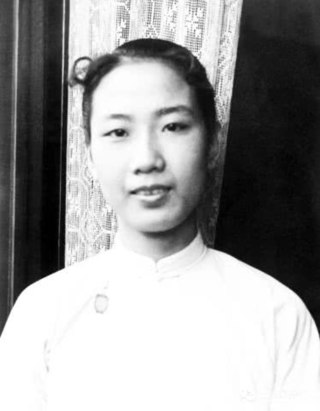
Yuan Xuefen was a noted performer in the Yue opera genre of Chinese opera. She has been called "arguably the most important actress in the recent history of Yueju [Shaoxing] opera". The only other artist to be ranked with her is Fu Quanxiang.
The Legend of Crazy Monk is a Chinese television series about the life of Ji Gong. The series was directed by Lin Tianyi and based on Guo Xiaoting's classical novel Biography of Ji Gong. It was a hot TV series recently in Guangdong Television, Jiangsu Television and Shenzhen Television. It is shown on Mediacorp Channel 8 at 7pm.













